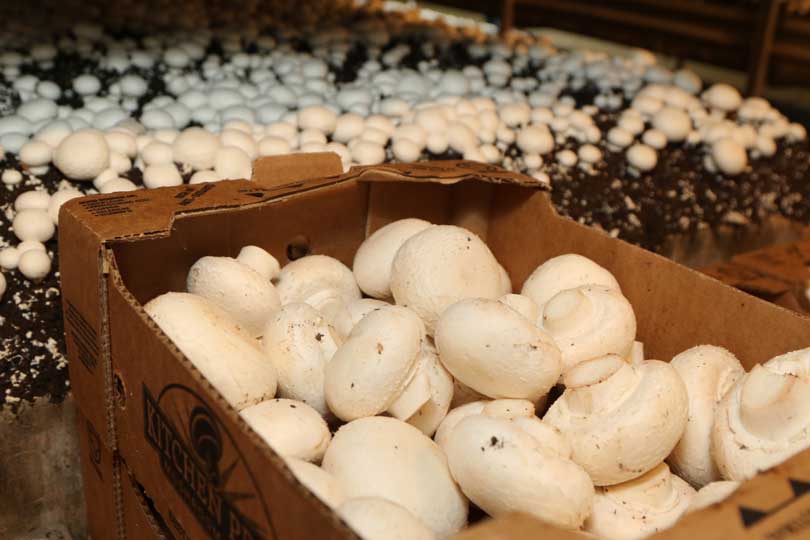By Jennifer Dorsett
Field Editor
Love ‘em or hate ‘em, mushrooms are a common ingredient in a variety of dishes. And one Texas farm family is bringing them to the masses.
The McLains, Gonzales County Farm Bureau members, provide mushrooms to produce aisles across the Lone Star State year-round.
They’ve been growing Kitchen Pride brand mushrooms since 1988.
“Texas was an under-served market,” Greg McLain, CEO of Kitchen Pride, said. “Back before fresh mushrooms were available around the country, they were in cans, and they were rubbery and kind of awful. That’s why so many people hated mushrooms.”
Kitchen Pride patriarch Darrell McLain began growing mushrooms commercially in 1973, first with food company Ralston Purina and then later through a joint venture in Oklahoma. He sold his half of the Oklahoma farm in the mid-1980s. Then Darrell and sons Greg and Phil set out for Texas.
Most mushrooms shipped into Texas at that time came from far away, Greg said. And they often weren’t at peak quality.
Gonzales made an ideal location. The town has easy access to big Texas cities, and area farms supply byproducts used to make the “secret sauce” for growing Texas’ tastiest mushrooms—compost.
“We’ve got suppliers we’ve been buying from since day one,” Greg said. “Wheat straw is very important for us, because it’s the base of our compost. So for 31 years now, we’ve been buying straw from some of the same farmers.”
Almost every component of the compost is an agricultural byproduct. Wheat straw is sprayed with reuse water from nearby livestock facilities. Then cottonseed meal, cotton burrs, chicken litter and brewers grains are mixed with gypsum.
Composting takes around 21 days. Kitchen Pride compost is soft and crumbly, with a soil-like consistency and earthy aroma. And it’s perfect for growing mushrooms.
The mushrooms are grown in environmentally-controlled rooms on rows of tall metal shelving. The shelves are lined with a nylon mat and a layer of compost. Kitchen Pride has 65 growing rooms capable of growing about 30,000 to 40,000 pounds of mushrooms each.
Growing starts with using millet or rye grain inoculated with pure mushroom culture, called spawn. In about 12 days, the spawn colonizes the compost with thousands of tiny white hairs, called mycelium, which looks like white mold.
A layer of peat moss is then applied on top of the mycelium. The mycelium strands knit together and form the fruiting bodies we know as mushrooms.
And mushrooms can double in size every 24 hours. In just 12 more days, they’re ready for harvest.
Over the next three weeks, each room is hand-harvested three times. From building the compost to the final harvest, it’s a 12-week cycle. The used compost is steamed to kill any pathogens, then hauled away for resale to the public as a soil additive.
The room is sterilized and the process begins all over again.
“We’re pretty well harvesting seven days a week, 365 days a year,” Greg said. “Mushrooms don’t really know whether there’s a holiday coming up or not, so we have somebody here 24 hours a day, 365 days a year.”
The mushrooms are packaged on-site before being loaded onto company-owned tractor trailers. The trucks haul about 260,000 pounds of mushrooms each week to delivery points across Texas.
“Generally, if we pick it today, it’s at the warehouse tomorrow morning,” Greg said. “And that’s one of the advantages we have over out-of-state producers, where it might be a two-day trip.”
About half of Kitchen Pride’s mushrooms go to wholesale. The rest are sold directly to consumers in supermarkets across the state including Central Market, Fiesta Foods, Walmart and Whole Foods, as well as a supplier of independent grocery stores.
Greg said it’s gratifying to see his family’s brand in the produce aisle and to know he grew a healthy, sustainable food people enjoy eating.
“It’s exciting to go into a store and see our mushrooms on the shelf,” he said. “We definitely take pride in that.”

